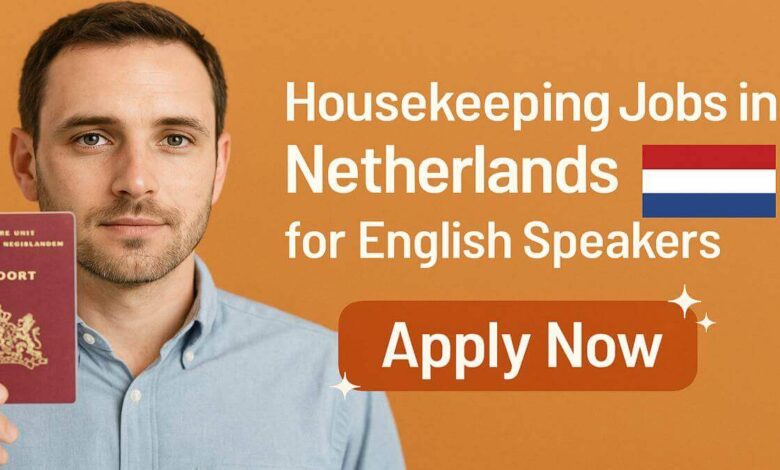
Housekeeping Jobs in Netherlands for English Speakers 2025
Are you an English speaker interested in working as a housekeeper in the Netherlands? While many housekeeping jobs require knowledge of Dutch, there are opportunities—especially in international hotels, hostels, and hospitality venues—where English-speaking staff are in demand.
This guide will walk you through the duties, qualifications, salary expectations, benefits, and how to successfully apply for these roles.
Why Consider Housekeeping in the Netherlands?
The Netherlands is known for its strong work-life balance, inclusive work environments, and excellent quality of life. Housekeeping jobs may serve as a starting point for many foreigners looking to live and work in the country. For English-speaking applicants, opportunities are most commonly found in cities with high tourist activity such as Amsterdam, Rotterdam, and The Hague.
Check Also: Visa Sponsorship Dairy Farm Worker Jobs in Luxembourg
Typical Duties and Responsibilities:
Housekeepers are responsible for maintaining cleanliness and hygiene in residences or commercial establishments such as hotels. Duties often include:
- Changing bed linens and towels
- Vacuuming and mopping floors
- Dusting and wiping surfaces
- Replenishing toiletries and other supplies
- Reporting maintenance issues or lost items
- Handling laundry duties including washing, drying, and ironing
- Deep cleaning tasks as needed
Key Qualifications and Skills:
Employers typically seek the following:
- High school diploma or GED (preferred but not always required)
- Basic proficiency in English
- Previous experience in housekeeping or cleaning (1+ years preferred)
- Attention to detail
- Physical stamina for long shifts
- Ability to work independently and within a team
- Friendly, customer-service-oriented demeanor
- Familiarity with cleaning equipment and chemicals
Average Salary:
According to the Dutch Employee Insurance Agency (UWV) and job market statistics:
- Average hourly wage: €11.50 to €13.50 per hour
- Monthly salary: €1,900 to €2,400 gross (full-time roles)
Pay can vary depending on location, employer, and level of experience.
Legal Requirements and Work Permits:
- EU/EEA/Swiss citizens do not need a work permit.
- Non-EU applicants typically require a sponsored work visa. Most housekeeping roles are considered low-skilled and may not qualify unless arranged via a staffing agency or as part of an au pair or domestic worker program.
Refer to the Dutch Immigration and Naturalization Service (IND) for official guidelines.
Benefits:
1. Legal Employment & Work Visa Support (in some cases)
- Some reputable employers, especially in hospitality (hotels, resorts, cleaning agencies), may assist with work visa applications.
- EU/EEA citizens don’t need a visa, but non-EU nationals might need sponsorship or an orientation year visa (for recent graduates).
2. Competitive Wages
- Minimum wage in the Netherlands (as of 2025): ~€13 per hour for those aged 21+.
- Many housekeeping jobs pay between €13–€17/hour, depending on experience, location (Amsterdam pays more), and employer.
3. Health Insurance & Social Security
- Employers typically contribute to Dutch social security.
- Employees are required to have Dutch health insurance, but costs can often be partly reimbursed by allowances.
4. Paid Holidays & Sick Leave
- Typically 20–25 paid vacation days per year (based on full-time employment).
- Paid sick leave may also be covered under Dutch labor law.
5. Flexible Working Hours
- Many part-time or flexible shift options available, ideal for students or people balancing other commitments.
- Day shifts, evening shifts, or weekend-only work are often available.
6. Opportunities to Improve Dutch Language Skills
- Being immersed in the workplace gives you a chance to learn Dutch on the job.
- Some employers even offer free or subsidized Dutch language classes.
7. Inclusive Work Environment
- The Netherlands is known for its tolerance and inclusivity.
- Many hospitality businesses are accustomed to hiring expats and English speakers.
8. Accommodation Assistance
- Larger hotel chains or cleaning agencies sometimes offer employee housing or help find shared housing, especially in tourist areas.
9. Growth Opportunities
- Possibility to move into supervisory or front-desk roles with experience and Dutch language improvement.
- Some companies offer training or promote from within.
How to Apply for Housekeeping Jobs in Netherlands for English Speakers 2025?
- Search Trusted Job Boards:
- Filter for English-speaking roles:
Use keywords such as “housekeeping English,” “cleaner hotel,” or “staff English.” - Prepare Your CV and Cover Letter:
- Tailor your resume to highlight relevant experience.
- Briefly explain your language skills, availability, and motivation.
- Submit Your Application:
- Follow application instructions carefully.
- Apply to multiple listings to increase your chances.
- Follow Up:
- Send a polite follow-up email if you don’t hear back in 1–2 weeks.
Conclusion:
Working as a housekeeper in the Netherlands can offer a stable job with growth opportunities, especially for English speakers in urban centers. While some legal and linguistic barriers exist, careful preparation, proper documentation, and targeted applications can help you succeed. Whether you’re seeking a short-term role or a long-term career path, the Dutch hospitality sector offers a supportive and diverse work environment.
Frequently Asked Questions:
Can I get a housekeeping job in the Netherlands without speaking Dutch?
Yes, many housekeeping jobs—especially in hotels or expat households—are open to English speakers. Knowing basic Dutch can be helpful but is not always required.
What qualifications do I need for a housekeeping job in the Netherlands?
Formal qualifications are not usually required. However, experience, attention to detail, and reliability are highly valued.
Do I need a work visa to get a housekeeping job in the Netherlands?
Yes, non-EU/EEA citizens typically need a work visa or residence permit. Some employers may offer visa sponsorship, but this is more common with formal agencies or hotel chains.




